
Gastric Cancer
Scope & Guideline
Shaping the Future of Gastric Cancer Care.
Introduction
Aims and Scopes
- Clinical Research and Trials:
Focuses on clinical studies, including randomized controlled trials, observational studies, and meta-analyses that evaluate treatment efficacy and safety in gastric cancer patients. - Molecular and Genetic Insights:
Emphasizes research on the molecular mechanisms underlying gastric cancer, including genetic mutations, epigenetic alterations, and the tumor microenvironment. - Innovative Treatment Strategies:
Explores novel therapeutic approaches, including targeted therapies, immunotherapies, and neoadjuvant/adjuvant treatments, with an emphasis on personalized medicine. - Epidemiology and Risk Factors:
Investigates the epidemiological trends, risk factors, and demographic characteristics associated with gastric cancer, contributing to better prevention and early detection strategies. - Surgical Techniques and Outcomes:
Covers advancements in surgical methods, including minimally invasive techniques, and their impact on patient outcomes and survival rates. - Quality of Life and Patient-Centered Care:
Addresses the psychosocial aspects of gastric cancer, including quality of life assessments and the development of supportive care strategies for patients.
Trending and Emerging
- Artificial Intelligence and Machine Learning:
There is a growing trend in utilizing AI and machine learning for diagnostic and prognostic purposes in gastric cancer, indicating a shift towards precision medicine. - Immunotherapy and Biomarkers:
Research focusing on immunotherapy, including PD-1/PD-L1 inhibitors, and the identification of biomarkers for treatment response is becoming increasingly prevalent. - Molecular Profiling and Genomic Studies:
Emerging studies are focusing on the molecular and genomic characteristics of gastric cancer, aiming to tailor therapies based on individual tumor profiles. - Minimally Invasive Surgical Techniques:
The trend towards studying minimally invasive surgical options, such as robotic gastrectomy and laparoscopic approaches, reflects evolving surgical practices aimed at improving patient outcomes. - Patient Quality of Life and Supportive Care:
An increased emphasis on quality of life assessments and supportive care strategies for patients undergoing treatment for gastric cancer is emerging, highlighting the importance of holistic patient management.
Declining or Waning
- Traditional Chemotherapy Regimens:
There is a noticeable decrease in studies focusing solely on traditional chemotherapy regimens, as the field increasingly shifts towards personalized and targeted therapies. - Basic Histopathology Studies:
Research that primarily focuses on basic histopathological features without linking to clinical outcomes or molecular characteristics has become less frequent, indicating a trend towards more integrative approaches. - Epidemiological Studies in Narrow Populations:
Studies that focus on narrow or specific populations without broader implications are declining, as there is a growing emphasis on global epidemiology and diverse populations. - Single-Center Studies:
The journal has seen a reduction in single-center studies, with a preference for multicenter and collaborative research that enhances the generalizability of findings. - Longitudinal Studies with Limited Follow-Up:
There is a waning interest in longitudinal studies that do not provide extensive follow-up data, as researchers aim for more comprehensive analyses that can inform treatment strategies.
Similar Journals
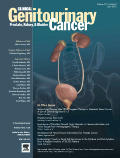
Clinical Genitourinary Cancer
Advancing knowledge in genitourinary oncology.Clinical Genitourinary Cancer, published by CIG MEDIA GROUP, LP, is a leading journal in the fields of Oncology and Urology, with an impressive impact reflected in its quartile rankings (Q2 in Oncology and Q1 in Urology for 2023) and strong Scopus rankings (22nd in Urology and 162nd in Oncology). The journal aims to innovate and inspire new research in genitourinary malignancies, providing a platform for the latest findings in diagnosis, treatment, and patient management. With its commitment to high-quality publications since its establishment in 2005, Clinical Genitourinary Cancer serves a crucial role in advancing the understanding of these complex conditions and enhancing clinical practices. Researchers, professionals, and students in the medical community are encouraged to engage with this essential resource, which facilitates open access to pioneering studies that drive the field forward.
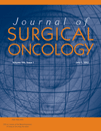
JOURNAL OF SURGICAL ONCOLOGY
Fostering Breakthroughs in Surgical Oncology PracticesThe JOURNAL OF SURGICAL ONCOLOGY, published by Wiley, stands as a pivotal resource for medical professionals, researchers, and students engaged in the fields of surgery and oncology. Established in 1969, this esteemed journal covers a diverse range of topics related to the surgical management of cancer, supporting advancements in treatment protocols and patient care. With a Q1 ranking in Surgery and Q2 rankings in both Medicine and Oncology for 2023, it holds a prominent position in the academic landscape, underscoring its impact in enhancing surgical techniques and oncological research. Researchers looking to disseminate their findings will benefit from the journal's rigorous peer-review process and commitment to publishing high-quality content that drives innovation in the field. For access, readers will find both print and online formats available, making vital research accessible to a broad audience committed to improving surgical oncology practice.

Bladder Cancer
Exploring innovative treatments for bladder cancer.Bladder Cancer, published by IOS PRESS, is a premier open access journal dedicated to advancing the field of oncology and urology, with a specific focus on bladder cancer research and treatment. Established in 2015 and continuing through to 2024, this journal aims to disseminate high-quality, peer-reviewed research that contributes to the understanding, diagnosis, and management of bladder cancer, a critical area of concern in urological oncology. With a robust publication record now encompassing open access since 2023, Bladder Cancer ensures accessibility to vital research for clinicians, researchers, and scholars worldwide. The journal's rankings in Scopus reflect its commitment to excellence, holding a Q3 category in both oncology and urology, with Scopus ranks of #78 in Urology and #285 in Oncology, showcasing its growing influence in the scientific community. By fostering dialogue and innovation, Bladder Cancer serves as an essential resource for those committed to improving patient outcomes in bladder oncology.

CANCER
Advancing the frontiers of cancer research.CANCER, published by Wiley, stands as a pivotal journal in the field of oncology and cancer research, boasting an impressive impact factor and consistently dynamic growth since its inception in 1948. With an ISSN of 0008-543X and an E-ISSN of 1097-0142, this esteemed journal is recognized for its rigorous peer-reviewed articles, making significant contributions to the understanding of cancer biology, treatment modalities, and clinical practices. CANCER holds a distinguished position in the academic community, securing its placement in the Q1 category for both cancer research and oncology, and ranks within the top percentiles on Scopus, indicating its high impact and relevance. The journal is particularly beneficial for researchers, professionals, and students seeking to stay abreast of the latest advancements in cancer science. By addressing essential research questions and providing pathways for new therapies, CANCER continues to play a crucial role in shaping the future of oncology and improving patient outcomes.
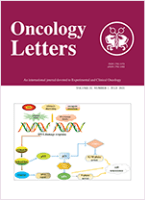
Oncology Letters
Advancing Cancer Research Through Innovative InsightsOncology Letters is a prominent academic journal dedicated to disseminating high-quality research in the fields of oncology and cancer research. Published by SPANDIDOS PUBL LTD and based in Greece, this journal has established a significant presence since its inception in 2010 and continues to contribute to the scientific community with a focus on both clinical and experimental oncology. Notably, it holds a respectable Q3 ranking in the categories of Cancer Research and Oncology as of 2023, highlighting its relevance and contribution to these critical fields. With a Scopus rank of #139/404 in Medicine – Oncology and #117/230 in Biochemistry, Genetics, and Molecular Biology – Cancer Research, Oncology Letters serves as a valuable platform for researchers, professionals, and students alike to explore emerging findings and innovative treatment approaches. Though it operates within a traditional subscription model, this journal prides itself on fostering accessible and impactful discourse in oncology, making it an essential resource for those committed to advancing cancer research and improving patient care.

Frontiers in Oncology
Innovating oncology through open access and collaboration.Frontiers in Oncology is a premier open access journal dedicated to advancing the field of oncology through innovative research and knowledge dissemination. Published by FRONTIERS MEDIA SA since 2011, this journal is based in Switzerland and holds an impressive Q2 ranking in both Cancer Research and Oncology as of 2023, highlighting its significance in the academic community. With its commitment to open access, Frontiers in Oncology ensures that vital research is readily available to researchers, healthcare professionals, and students around the globe, enhancing collaboration and fostering breakthroughs in cancer research. The journal's robust Scopus rankings further illustrate its academic influence, with notable positions in the fields of Oncology and Cancer Research. By covering a wide range of topics within oncology, this journal serves as a vital resource, supporting the rapid evolution of cancer treatment, diagnostics, and patient care strategies.

Journal of the Egyptian National Cancer Institute
Pioneering research for a world free of cancer.Journal of the Egyptian National Cancer Institute, published by SPRINGER, serves as a vital platform for disseminating innovative research in the field of oncology and cancer research. With both ISSN 1110-0362 and E-ISSN 2589-0409, this Open Access journal has been committed to making significant contributions to the scientific community since its inception in 2005. Operating from its base in Egypt, it has established itself as an important resource for researchers, practitioners, and students alike, offering insights into contemporary issues and advancements in cancer care. Recognized in the 2023 category quartiles as Q3 in Cancer Research and Q3 in Oncology, the journal is positioned to impact the ongoing discourse in cancer treatment strategies and health policy. As it continues to publish peer-reviewed articles through available Open Access avenues, the Journal of the Egyptian National Cancer Institute remains dedicated to enhancing the knowledge base and collaborative efforts within the global cancer research community.
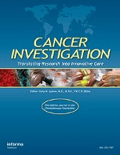
CANCER INVESTIGATION
Exploring the frontiers of cancer research with precision.CANCER INVESTIGATION is a distinguished peer-reviewed journal published by Taylor & Francis Inc, dedicated to the advancing field of cancer research and oncology. With an ISSN of 0735-7907 and E-ISSN of 1532-4192, this journal has been a pivotal resource for professionals and researchers since its inception in 1983, continually contributing to the evolving landscape of cancer investigation until its convergence in 2024. CANCER INVESTIGATION boasts noteworthy rankings in 2023, including Q3 in Cancer Research and Q2 in Medicine (miscellaneous), highlighting its relevance and impact in these critical areas. The journal's commitment to disseminating innovative research and comprehensive reviews makes it an essential platform for those engaged in cancer studies and related disciplines. While currently not available as an open-access publication, CANCER INVESTIGATION remains an invaluable tool for understanding the complexities of cancer, offering insights that drive scientific advancements and improve patient outcomes.

International Journal of Cancer Management
Exploring breakthroughs in oncology and cancer management.The International Journal of Cancer Management is a distinguished publication dedicated to advancing knowledge and research in the fields of cancer management, oncology, pharmacology, and radiology. Published by BRIEFLAND in the Netherlands, this journal serves as a vital resource for researchers, healthcare professionals, and students interested in the latest developments in cancer care and treatment strategies. With an ISSN of 2538-4422 and an E-ISSN of 2538-497X, the journal features a range of peer-reviewed articles that cover diverse aspects of cancer management, reflecting its commitment to high-quality, impactful research. The journal ranks in the Q4 category for Cancer Research and Oncology and Q3 for both Pharmacology and Surgery in 2023, signifying its growing influence in the scientific community. Through its open access format, the International Journal of Cancer Management ensures that critical research findings are accessible to all, promoting collaboration and innovation in the battle against cancer. Researchers looking to share their findings or learn more about current trends will find this journal an invaluable addition to their professional toolkit.
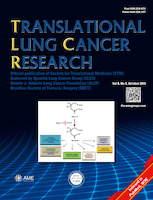
Translational Lung Cancer Research
Advancing lung cancer research for a healthier tomorrow.Translational Lung Cancer Research is a leading journal dedicated to advancing the field of oncology, particularly focusing on groundbreaking discoveries in lung cancer treatment and management. Published by AME Publishing Company, this journal boasts an impressive Q1 classification in the 2023 Oncology category, reflecting its significant contribution to the scientific community, with an outstanding Scopus rank of #92 out of 404 in Medicine _ Oncology, placing it in the 77th percentile. With its commitment to open access, the journal fosters international collaboration and accessibility, making cutting-edge research available to a wide audience. The scope of Translational Lung Cancer Research encompasses clinical trials, experimental studies, and translational research that bridge the gap between laboratory findings and clinical applications. Researchers, professionals, and students seeking to keep abreast of the latest developments in lung cancer research will find invaluable insights within its pages. For further information, please contact at FLAT-RM C 16F, KINGS WING PLAZA 1, NO 3 KWAN ST, SHATIN, HONG KONG.